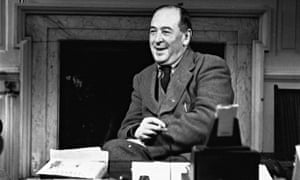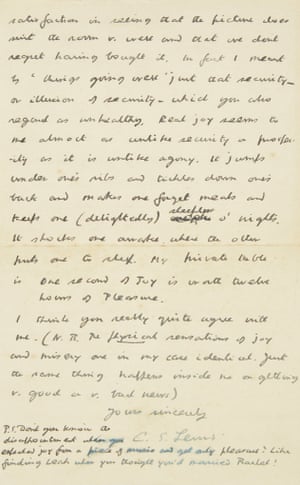Unseen CS Lewis letter defines his notion of joy
Author of spiritual memoir Surprised By Joy tells correspondent that joy is ‘almost as unlike security or prosperity as it is unlike agony’
Alison Flood
Tuesday 9 December 2014

‘One second of joy is worth 12 hours of Pleasure’ … CS Lewis. Photograph: John Chillingworth/Getty Images

‘One second of joy is worth 12 hours of Pleasure’ … CS Lewis. Photograph: John Chillingworth/Getty Images
A letter from CS Lewis which was discovered inside a secondhand book sees the author writing of how “real joy … jumps under ones ribs and tickles down one’s back and makes one forget meals and keeps one (delightedly) sleepless o’ nights”.
Believed to be previously unpublished, the letter to a “Mrs Ellis” was written by Lewis on 19 August 1945, and sees the author unpicking the concept of joy. Three years later, Lewis would expand on the subject in his memoir Surprised by Joy: The Shape of My Early Life, the account of his conversion to Christianity. “In the Trinity Term of 1929 I gave in, and admitted that God was God, and knelt and prayed: perhaps, that night, the most dejected and reluctant convert in all England,” he would write, taking the book’s title from the eponymous Wordsworth poem.Before he began work on the memoir, however, Lewis tells Ellis in this letter that “everything is going well”, but goes on to explain that he does not mean “joy” by this. “In fact I meant by ‘things going well’ just that security – or illusion of security – which you also regard as unhealthy. Real joy seems to me almost as unlike security or prosperity as it is unlike agony,” he writes.
“It jumps under one’s ribs and tickles down one’s back and makes one forget meals and keeps one (delightedly) sleepless o’ nights. It shocks one awake when the other puts one to sleep. My private table is one second of joy is worth 12 hours of Pleasure. I think you really quite agree with me.”
The handwritten letter had been enclosed within a copy of A Problem of Painbought from a secondhand bookshop, and is set to be auctioned later this month. “A private owner bought the book some years ago, and some time later discovered the letter inside it. As far as we know it’s unpublished,” said Chris Albury of Dominic Winter Auctioneers. “We haven’t been able to discover who Mrs Ellis is – there’s no envelope, because the owner just found it in the book.”
Lewis goes on to write of how “the physical sensations of joy and misery are in my case identical”, and of how “just the same thing happens inside me on getting the good or the bad news”. He adds a short postscript to the letter: “Don’t you know the disappointment when you expected joy from a piece of music and get only pleasure: Like finding Leah when you thought you’d married Rachel!”Joy, he would write in his memoir, later, “must be sharply distinguished both from Happiness and Pleasure. Joy (in my sense) has indeed one characteristic, and one only, in common with them; the fact that anyone who has experienced it will want it again …
I doubt whether anyone who has tasted it would ever, if both were in his power, exchange it for all the pleasures in the world. But then Joy is never in our power and Pleasure often is.”It seems clear, said Albury, that Lewis’s letter to Mrs Ellis “wasn’t a one-off correspondence - this is someone he knew personally. It’s intimate, full of quite deep, philosophical thoughts, that you would only share with someone on the same wavelength.”
The letter will be auctioned on 18 December, with a guide price of £1,200 to £1,500. “We’ve only had a handful of good CS Lewis letters before and they’ve all attracted strong interest,” said Albury. “CS Lewis letters don’t come up very often.”
The auction will also include an autographed letter from JK Rowling, in response to a missive from educational consultant Howard Brayton. Brayton had pointed out that the mythical “wyvern” had been omitted from Rowling’s Fantastic Beasts and Where to Find Them, which is ostensibly a textbook by Newt Scamander. He noted to “professor Scamander” that the beast, “a winged dragon with two feet like those of an eagle, and a serpent-like barbed tail”, was believed to be real in 1700, and is referred to by the poet Robert Browning, asking Rowling/Scamander if the wyvern is “in fact a fantastic beast, or a figment of muddled muggle minds”.
“Ah yes, the fabled ‘wyvern’. Well, naturally I had heard the rumours – the poet Browning’s allusion had not escaped me …” responds Rowling, who signs her name ‘Newt Scamander / aka JK Rowling”. “Extensive research, however, has convinced me that the beast in question was a Common Welsh Green whose legs were counted by a Muggle with a very shaky grasp of numeracy … It is always a blow to have a cherished part of one’s life dismissed as a figment of the imagination … but we wizards have to deal with that every day.”
The letter is expected to sell for up to £1,500, said Dominic Winter.





No comments:
Post a Comment